Raising chickens for eggs is a rewarding and fulfilling experience that can save money and provide fresh, nutritious chicken eggs from your backyard. Whether you’re new to it or a veteran chicken keeper, this comprehensive guide will cover everything you need to know to start and maintain a thriving flock. We will cover essential topics such as equipment, where to buy chickens, the difference between chicks, pullets, and hens, and keeping your chickens healthy.
Preparing for Your Chickens
Before you bring your chickens home, it’s essential to prepare a safe and comfortable living space for them.
Housing and Fencing
Chickens need a coop to protect them from predators and provide a secure place to roost at night. Ensure the coop has adequate ventilation, insulation, and enough space for each chicken – at least 2-3 square feet per bird. Use wood, metal, or plastic for the coop’s construction, ensuring it’s sturdy and weather-resistant. For additional protection against predators, consider installing hardware cloth around the lower part of the coop and burying it a foot into the ground.
Include a fenced run area for your chickens to roam and forage during the day. The run should provide at least 8-10 square feet per chicken. Use sturdy fencing materials, like chicken wire or hardware cloth, to keep predators out and your chickens safe.
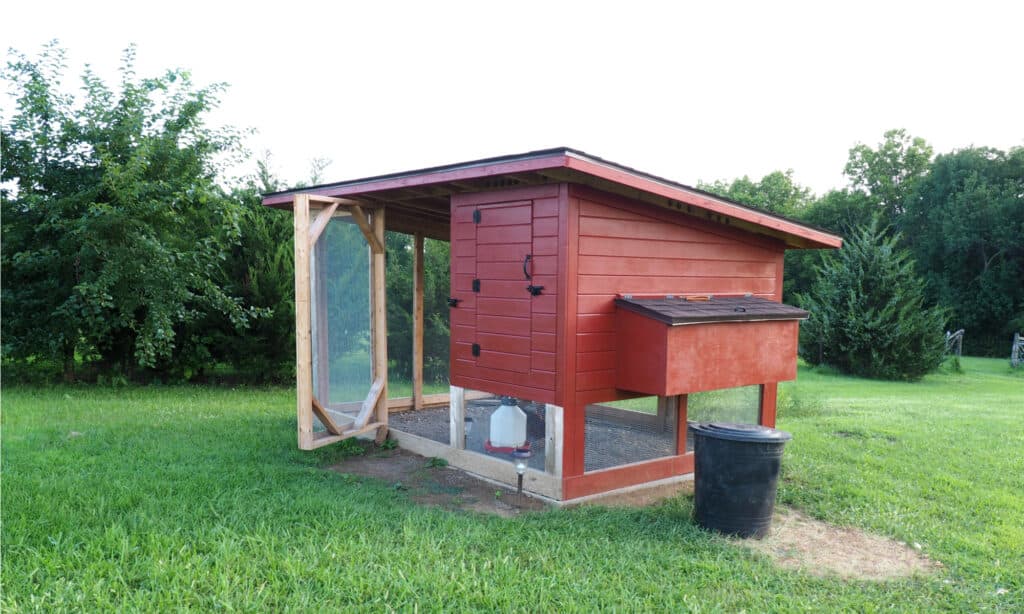
Chickens need a sturdy and weather-resistant coop to protect them from predators and provide a secure place to roost at night.
©Cynthia Farmer/Shutterstock.com
Feed and Watering Systems
Chickens need constant fresh water and a nutritious diet to thrive. Invest in a high-quality feeder and waterer to keep the food and water clean and prevent waste. Position them at a height that allows the chickens to access them comfortably without crouching or stretching too much. Consider using a hanging or treadle feeder; these designs help minimize spills and deter pests. Clean and refill the feeder and waterer regularly to maintain a hygienic environment.
Nesting Boxes and Perches
Provide a minimum of one nesting box for every four hens. These boxes should be in a quiet, dark coop area filled with comfortable nesting material like straw or wood shavings. The boxes should be spacious enough for the hens to turn around comfortably, approximately 12 inches square. Clean the nesting boxes regularly to ensure a clean and sanitary space for egg-laying.
Install perches in the coop, allowing at least 8-10 inches of perch space per bird, and place them higher than the nesting boxes to encourage roosting. Use wooden dowels or 2x4s with rounded edges for perches, ensuring they’re securely attached to the coop’s walls or frame. Protect the perches away from feeders, waterers, and nesting boxes to prevent contamination.
Choosing Your Chickens
Chicks are baby chickens that require special care and attention, while pullets are young hens that haven’t started laying eggs yet. Adult hens that are already laying eggs may be the best choice for beginners who want to start collecting eggs immediately. Chicks and pullets require more time and effort but can be a rewarding experience as you watch them grow and develop.
If you choose to start with chicks, be prepared to invest time in brooding, feeding, and monitoring their growth. Pullets are easier to raise as they are more independent and require less hands-on care. If you opt for adult hens, inquire about their age and laying history to ensure they are still productive layers.
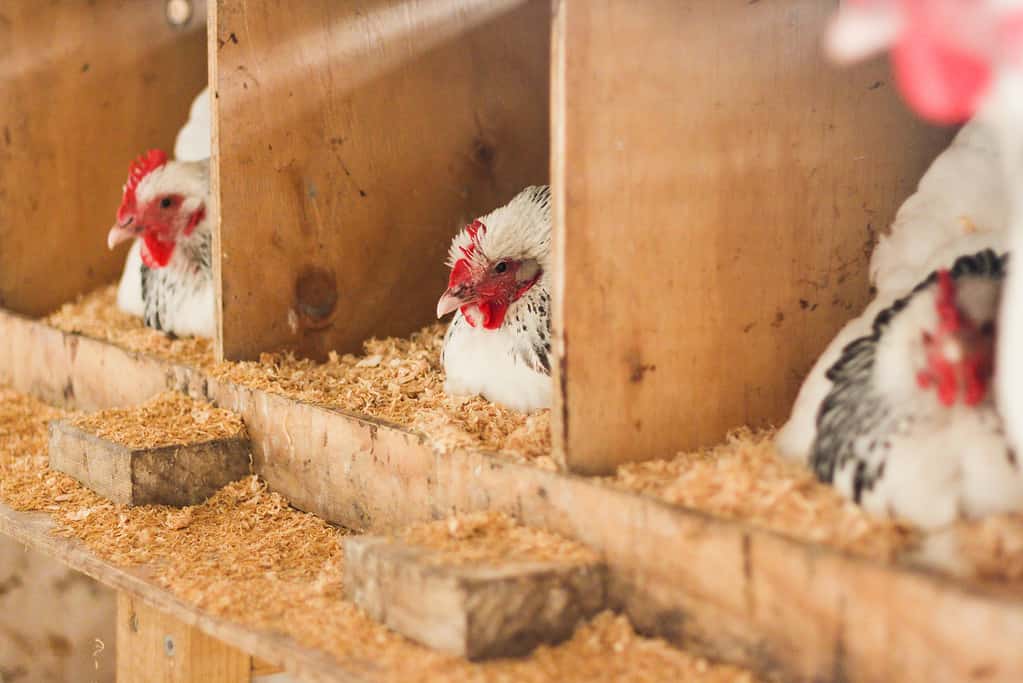
Adult hens that are already laying eggs may be the best choice for beginners.
©iStock.com/nedjelly
Where to Buy Chickens
You can purchase chicks, pullets, or hens from local farms, feed stores, or online hatcheries. Be sure to choose a reputable seller and research their reviews and reputation. Buying from a local source can be advantageous, as you can see the birds’ living conditions and ask questions directly to the seller. Online hatcheries often offer a more extensive selection of breeds, but be prepared to pay shipping fees and ensure that the hatchery has a good reputation for healthy birds.
Selecting the Right Breed
Chicken breeds have varying temperaments, egg production rates, and climate preferences. Research the breeds best suited for your climate and desired egg production levels. Some popular choices for egg layers include Rhode Island Reds, Plymouth Rocks, and Leghorns. Consider factors like egg size, egg color, and the breed’s adaptability to your local climate when making your decision.
Raising Chicks
While raising chicks seems exciting, knowing what you’re getting yourself into is essential. Knowing how to raise them is critical.
Brooding Equipment and Set-Up
Chicks need a warm, draft-free brooder for the first 6-8 weeks of their lives. You’ll need a heat lamp, thermometer, and a brooder box or enclosure with bedding, such as pine shavings. The heat lamp should be positioned to provide a temperature gradient, with one side of the brooder at 90-95°F for the first week, decreasing by 5°F each week until the chicks are ready to move outside. Monitor the temperature using a thermometer and adjust the heat lamp’s height as needed.
Feeding and Watering
Provide chicks with a starter feed specifically formulated for their age and growth requirements. This high-protein feed will support their rapid growth during the first few weeks. Ensure they have access to clean water at all times, and consider using a chick waterer to prevent spillage and drowning. As the chicks grow, they transition to a grower feed and eventually to a food formulated for laying eggs.
Monitoring Growth and Health
Monitor your chicks’ development and well-being, ensuring they remain energetic and aware and have consistent weight gain. Observe their behavior for signs of illness, such as lethargy, drooping wings, or labored breathing. Talk to a vet or experienced chicken owner if you see any problems. Regularly clean the brooder and replace the bedding to maintain a healthy environment for your growing chicks.
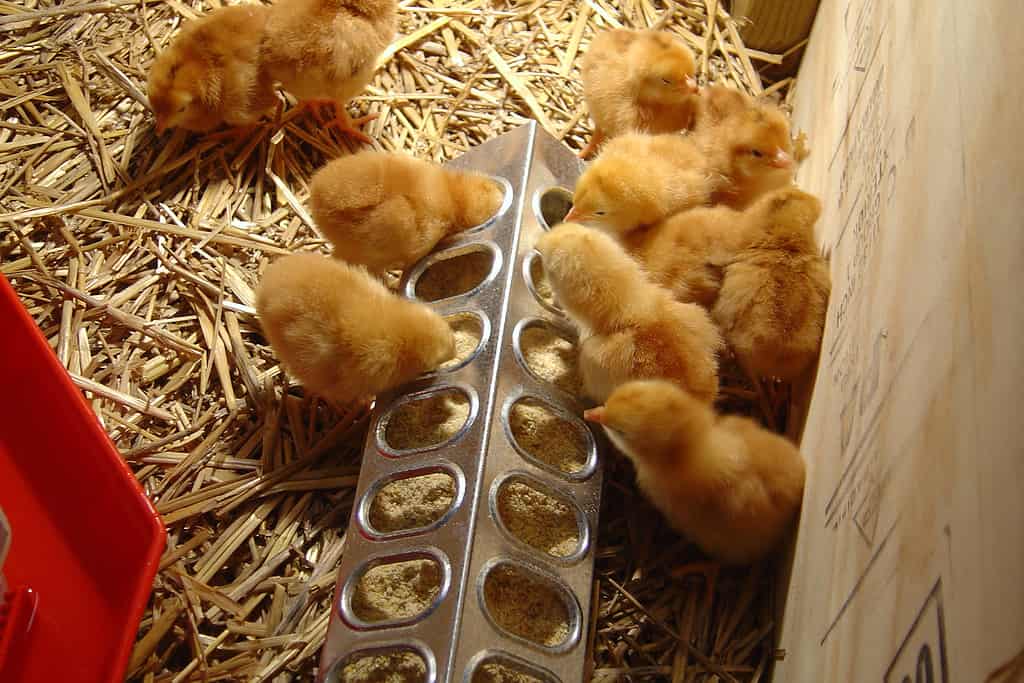
It’s important to provide chicks with a starter feed specifically formulated for their age and growth requirements.
©iStock.com/Jennifer Chamblee
Caring for Your Chickens
To help your chickens thrive, ensure you become aware of the vital ways to care for them.
Daily Maintenance
Check on your chickens daily to ensure their food and water supplies are clean and sufficient. Collect eggs, clean the coop, and replace soiled bedding as needed. Remove any broken eggs, spilled food, or dirty water to prevent the spread of disease. Observe your chickens for signs of illness or injury, and address any issues promptly.
Nutrition and Feeding
Feed your chickens a balanced layer feed once they start laying eggs. Layer feed is formulated to meet the nutritional needs of egg-laying hens. You can also offer them treats like fruits, vegetables, and grains in moderation. Always provide access to grit, which helps chickens digest food, and oyster shells or another calcium supplement to support strong eggshells.
Health Care and Preventative Measures
Implement a regular parasite control regimen for your flock, including treating internal and external parasites. Keep the coop clean and well-ventilated to prevent respiratory issues and the spread of diseases. If you suspect a health issue, consult a veterinarian or an experienced chicken keeper for advice.
Collecting and Storing Eggs
Collecting and storing eggs is an integral part of keeping chickens.
When to Expect Eggs
Most chicken breeds begin laying eggs between 18 and 24 weeks of age, but this can vary depending on the breed and individual bird. Factors like daylight hours, diet, and stress can also impact when your hens start laying eggs. Provide supplemental lighting during winter to maintain consistent egg production, as hens require approximately 14 hours of daylight to lay regularly.
Collecting and Cleaning
Check for eggs in the nesting boxes at least once or twice a day. Collecting eggs frequently helps prevent them from getting dirty or cracked and discourages hens from eating their eggs. If you find dirty eggs, gently clean them with a damp or damp cloth. Avoid soaking or scrubbing eggs, as this can remove the natural protective coating (bloom) and make them more susceptible to bacterial contamination.
Storing Fresh Eggs
Store your freshly collected eggs in a clean carton or an egg holder in the refrigerator. The ideal storage temperature for eggs is between 35 degrees Fahrenheit and 40 degrees Fahrenheit. Keep the eggs with the pointed end facing down to maintain freshness. Freshly laid eggs can last several weeks in the refrigerator, but it’s best to use them within two to three weeks for optimal taste and quality.
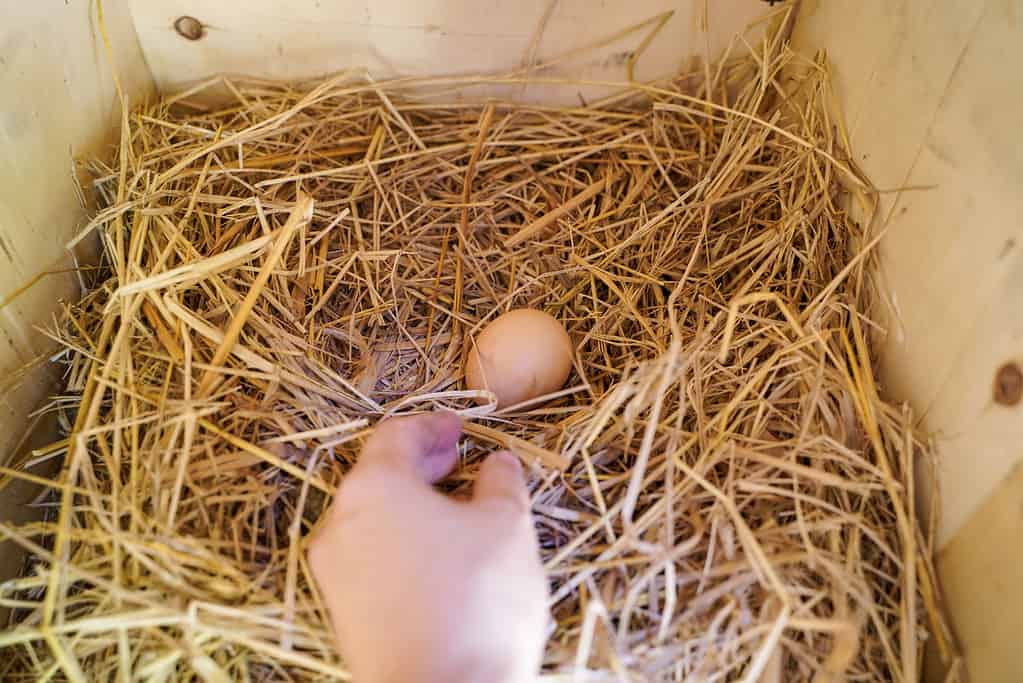
Checking for eggs in the nesting boxes at least once or twice a day helps prevent them from getting dirty, cracked, or eaten.
©iStock.com/happydancing
Troubleshooting and Common Issues
Knowing some common and potential issues you may face with your chickens is essential.
Predator Prevention
Predators pose a significant threat to backyard chicken flocks. To protect your birds, use secure locks on coop doors and windows, install hardware cloth around the coop and run, and consider adding electric fencing or motion-activated lights as additional deterrents. Regularly inspect your coop and run for signs of attempted entry or damage.
Common Health Problems
Chickens can be affected by various health issues, including respiratory infections, mites, lice, and worms. Keep a close eye on your flock and promptly address any signs of illness or parasites. Consult a veterinarian or experienced chicken keeper for advice on treatment options.
Dealing with Egg Laying Issues
Occasionally, hens may experience issues with egg-laying, such as soft-shelled eggs, egg binding, or laying thin-shelled eggs. Ensure your hens can access calcium supplements like an oyster shell to support strong eggshells. If a hen appears distressed due to egg binding (an egg is stuck in the oviduct), consult a veterinarian for guidance. Maintain a consistent lighting schedule and a balanced diet to support healthy egg-laying.
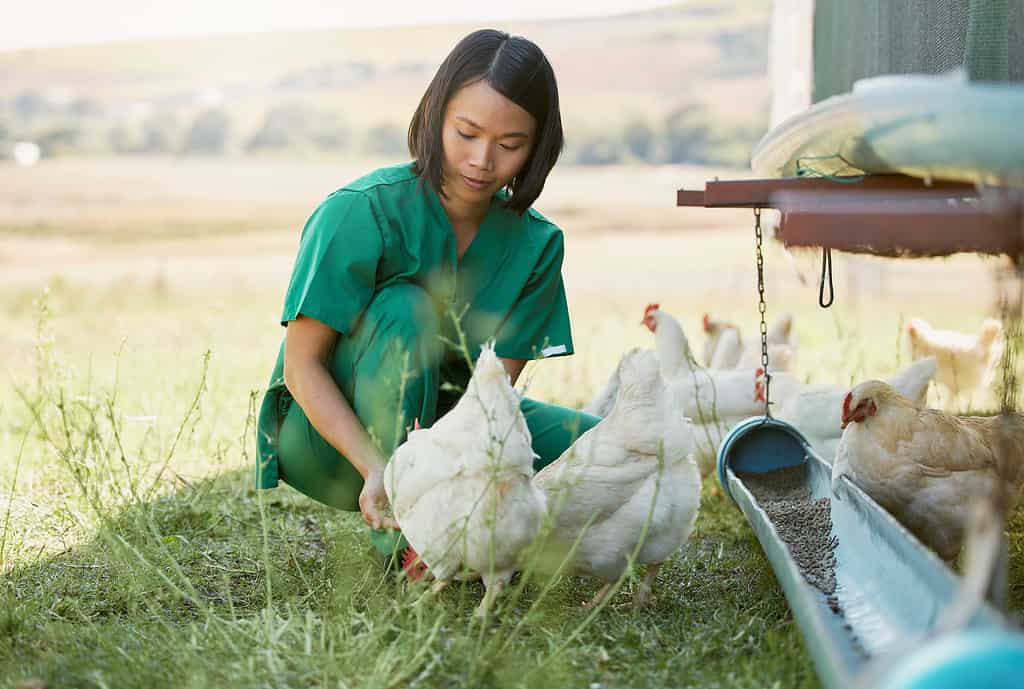
Chickens can be affected by various health issues, including respiratory infections, mites, lice, and worms which may require veterinary care.
©iStock.com/PeopleImages
Conclusion
Raising chickens for eggs can be a fun and fulfilling hobby with many benefits, including providing you with fresh, nutritious eggs. This complete how-to guide covers everything from housing and equipment to choosing and caring for your chickens. Follow the steps outlined in this guide, and you’ll be well on your way to enjoying the many rewards of keeping a happy, healthy flock of egg-laying chickens.
The photo featured at the top of this post is © monticello/Shutterstock.com
Thank you for reading! Have some feedback for us? Contact the AZ Animals editorial team.







